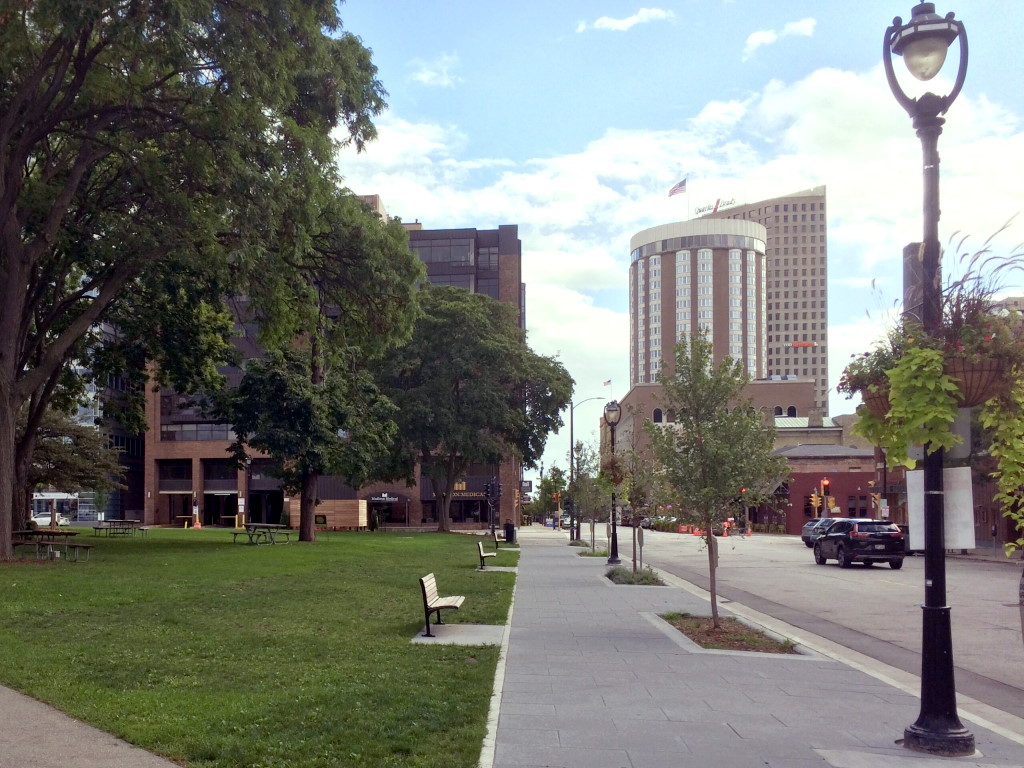Think Tank Studying Ways to Finance Parks Maintenance
Massive backlog of county parks infrastructure projects requires creative solutions.
In 2019, a local public parks advocacy group placed ‘for sale” signs in parks around the county. The goal was to highlight the financial peril of the parks system, and the possibility that park assets would one day need to be sold.
The group was responding to a report by the non-partisan think tank Wisconsin Policy Forum (WPF) that said the parks system may have to someday “liquidate” assets. Then County Executive Chris Abele responded, “Let me be clear: we have no plans to sell Milwaukee County parks.” But he added that the system had a “decade-long funding imbalance” that left it at a “breaking point” of being able to to maintain parks assets and services.
That fundamental fiscal reality has only gotten worse. In 2022, another policy forum report, called “Sinking Treasure,” again warned that the system has an insurmountable maintenance and infrastructure project backlog, estimated at about half a billion dollars, that may eventually require “liquidation.”
Liquidating county parkland is unlikely to happen in the near or long term. But the system has already been slowly transforming in recent years in the face of such an unsustainable fiscal reality. The department has been forced to focus the majority of its operational resources on services and amenities that generate revenue, leaving less for the trails, playgrounds, gardens, athletic fields and courts that the policy forum called the system’s “historical mission.” And the department has begun to tell policymakers that it has more infrastructure than it can afford to maintain and needs to begin studying what can go.
The policy forum has recently begun work on a new report commissioned by Parks that will study how the system can partner with other governmental entities like local municipalities or the Milwaukee Metropolitan Sewerage District (MMSD) to address the maintenance needs of the system. The report will be a follow-up to “Sinking Treasure” and offer a greater analysis of these two options mentioned in that report.
MMSD and Parks?
Partnerships between the sewerage district and the parks system are in fact nothing new. The two entities have partnered on projects before, including stormwater and flood control projects in parks like Jackson Park and Pulaski Park. The two institutions have areas of mutual interest, something that is a geographic reality as rivers under the jurisdiction of MMSD flow through some county parks. Of interest is the fact that the sewerage district does not have the same limitations on levying property taxes that local and county governments do.
But up until now, the relationship between Parks and MMSD has been transactional, said Jim Tarantino, Parks deputy director, and Parks is interested in researching, “Can this partnership grow beyond a transactional relationship? And are there areas of mutual interests that we could expand and more formalize?”
Rob Henken, WPF president, told Urban Milwaukee that the policy forum is analyzing these areas of “overlapping” interest and the possibility that MMSD could take on a greater role in park maintenance. “Now, there’s all sorts of questions about what the law would allow, in terms of the ability of MMSD to use those funding sources to pay for parks, maintenance and related needs,” Henken said. So his group is researching ideas that are still in the “conceptual stage,” he noted,
“It’s not a foregone conclusion that MMSD would have carte blanche to raise revenue to take over administration of parks,” he said.
But if the idea of the sewerage district taking over some maintenance of the parks was “fleshed out” in a final report, “then I think you would have to, by necessity, look at whether that would or should involve some type of long term lease or even a transfer of ownership,” Henken said. “But it’s really too early to speculate whether that would be appropriate and what that would take from a legal perspective and whether it would even be viable.”
Municipalities and County Parks
In recent years, Milwaukee County Parks has agreed to leases of parks to local municipalities with the proviso that the municipalities take over maintenance and preserve its status as a public park. The most recent example was in the City of Greenfield, which leased Kulwicki Park from the county so it could fund improvements and programming at the park.
The policy forum’s research will also look into how parks can expand its relationships with local governments to fund park improvements. “It’s not as if there are many municipal governments out there that are flush with money,” Henken said, but municipalities do have access to financing mechanisms that simply aren’t available to the county.
Specifically, tax incremental financing. Tarantino told Urban Milwaukee that TIF districts in downtown Milwaukee are already financing improvements at county parks like Zeidler Union Square, Juneau Park, Cathedral Square Park and Veterans Park.
UPDATE: An earlier version of this article referred to the wrong form of municipal government for Greenfield.
If you think stories like this are important, become a member of Urban Milwaukee and help support real, independent journalism. Plus you get some cool added benefits.
MKE County
-
Fellow Judge Testifies in Dugan Case
 Dec 16th, 2025 by Graham Kilmer
Dec 16th, 2025 by Graham Kilmer
-
Key Questions in Dugan Trial Take Shape on First Day
 Dec 15th, 2025 by Graham Kilmer
Dec 15th, 2025 by Graham Kilmer
-
FTA Tells Milwaukee to Crack Down on Fare Evasion — Even Where Fares Don’t Exist
 Dec 12th, 2025 by Graham Kilmer
Dec 12th, 2025 by Graham Kilmer






















